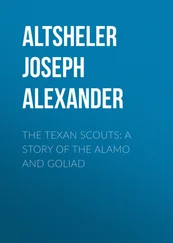Joseph Altsheler - The Guns of Shiloh - A Story of the Great Western Campaign
Здесь есть возможность читать онлайн «Joseph Altsheler - The Guns of Shiloh - A Story of the Great Western Campaign» — ознакомительный отрывок электронной книги совершенно бесплатно, а после прочтения отрывка купить полную версию. В некоторых случаях можно слушать аудио, скачать через торрент в формате fb2 и присутствует краткое содержание. Жанр: foreign_children, foreign_antique, foreign_prose, prose_military, на английском языке. Описание произведения, (предисловие) а так же отзывы посетителей доступны на портале библиотеки ЛибКат.
- Название:The Guns of Shiloh: A Story of the Great Western Campaign
- Автор:
- Жанр:
- Год:неизвестен
- ISBN:нет данных
- Рейтинг книги:5 / 5. Голосов: 1
-
Избранное:Добавить в избранное
- Отзывы:
-
Ваша оценка:
- 100
- 1
- 2
- 3
- 4
- 5
The Guns of Shiloh: A Story of the Great Western Campaign: краткое содержание, описание и аннотация
Предлагаем к чтению аннотацию, описание, краткое содержание или предисловие (зависит от того, что написал сам автор книги «The Guns of Shiloh: A Story of the Great Western Campaign»). Если вы не нашли необходимую информацию о книге — напишите в комментариях, мы постараемся отыскать её.
The Guns of Shiloh: A Story of the Great Western Campaign — читать онлайн ознакомительный отрывок
Ниже представлен текст книги, разбитый по страницам. Система сохранения места последней прочитанной страницы, позволяет с удобством читать онлайн бесплатно книгу «The Guns of Shiloh: A Story of the Great Western Campaign», без необходимости каждый раз заново искать на чём Вы остановились. Поставьте закладку, и сможете в любой момент перейти на страницу, на которой закончили чтение.
Интервал:
Закладка:
The veteran, Scott, full of triumphs and honors, but feeling himself out of place in his old age, went into retirement. McClellan, now in sole command, still lingered and delayed, while the South, making good use of precious months, gathered all her forces to meet him or whomsoever came against her.
Youth chafed most against the long waiting. It seemed to Dick and his mathematical Vermont friend that time was fairly wasting away under their feet, and the wise sergeant agreed with them.
The weather had grown so cold now that they built fires for warmth as well as cooking, and the two youths sat with Sergeant Whitley one cold evening in late October before a big blaze. Both were tanned deeply by wind, sun and rain, and they had grown uncommonly hardy, but the wind that night came out of the northwest, and it had such a sharp edge to it that they were glad to draw their blankets over their backs and shoulders.
Dick was re-reading a letter from his mother, a widow who lived on the outskirts of Pendleton. It had come that morning, and it was the only one that had reached him since his departure from Kentucky. But she had received another that he had written to her directly after the Battle of Bull Run.
She wrote of her gratitude because Providence had watched over him in that dreadful conflict, all the more dreadful because it was friend against friend, brother against brother. The state, she said, was all in confusion. Everybody suspected everybody else. The Southerners were full of victory, the Northerners were hopeful of victory yet to come. Colonel Kenton was with the Southern force under General Buckner, gathered at Bowling Green in that state, but his son, her nephew Harry, was still in the east with Beauregard. She had heard that the troops of the west and northwest were coming down the Ohio and Mississippi in great numbers, and people expected hard fighting to occur very soon in western and southern Kentucky. It was all very dreadful, and a madness seemed to have come over the land, but she hoped that Providence would continue to watch over her dear son.
Warner and the sergeant knew that the letter was from Dick’s mother, but they had too much delicacy to ask him questions. The boy folded the sheets carefully and returned them to their place in the inside pocket of his coat. Then he looked for a while thoughtfully into the blaze and the great bed of coals that had formed beneath. As far as one could see to right and left like fires burned, but the night remained dark with promise of rain, and the chill wind out of the northwest increased in vigor. The words just read for the fifth time had sunk deep in his mind, and he was feeling the call of the west.
“My mother writes,” he said to his comrades, “that the Confederate general, Buckner, whom I know, is gathering a large force around Bowling Green in the southern part of our state, and that fighting is sure to occur soon between that town and the Mississippi. An officer named Grant has come down from Illinois, and he is said to be pushing the Union troops forward with a lot of vigor. Sergeant, you are up on army affairs. Do you know this man Grant?”
Sergeant Whitley shook his head.
“Never heard of him,” he replied. “Like as not he’s one of the officers who resigned from the army after the Mexican War. There was so little to do then, and so little chance of promotion, that a lot of them quit to go into business. I suppose they’ll all be coming back now.”
“I want to go out there,” said Dick. “It’s my country, and the westerners at least are acting. But look at our army here! Bull Run was fought the middle of summer. Now it’s nearly winter, and nothing has been done. We don’t get out of sight of Washington. If I can get myself sent west I’m going.”
“And I’m going with you,” said Warner.
“Me, too,” said the sergeant.
“I know that Colonel Newcomb’s eyes are turning in that direction,” continued Dick. “He’s a war-horse, he is, and he’d like to get into the thick of it.”
“You’re his favorite aide,” said the calculating young Vermonter. “Can’t you sow those western seeds in his mind and keep on sowing them? The fact that you are from this western battle ground will give more weight to what you say. You do this, and I’ll wager that within a week the Colonel will induce the President to send the whole regiment to the Mississippi.”
“Can you reduce your prediction to a mathematical certainty?” asked Dick, a twinkle appearing in his eye.
“No, I can’t do that,” replied Warner, with an answering twinkle, “but you’re the very fellow to influence Colonel Newcomb’s mind. I’m a mathematician and I work with facts, but you have the glowing imagination that conduces to the creation of facts.”
“Big words! Grand words!” said the sergeant.
“Never let Colonel Newcomb forget the west,” continued Warner, not noticing the interruption. “Keep it before him all the time. Hint that there can be no success along the Mississippi without him and his regiment.”
“I’ll do what I can,” promised Dick faithfully, and he did much. Colonel Newcomb had already formed a strong attachment for this zealous and valuable young aide, and he did not forget the words that Dick said on every convenient occasion about the west. He made urgent representations that he and his regiment be sent to the relief of the struggling Northern forces there, and he contrived also that these petitions should reach the President. One day the order came to go, but not to St. Louis, where Halleck, now in command, was. Instead they were to enter the mountains of West Virginia and Kentucky, and help the mountaineers who were loyal to the Union. If they accomplished that task with success, they were to proceed to the greater theatre in Western Kentucky and Tennessee. It was not all they wished, but they thought it far better than remaining at Washington, where it seemed that the army would remain indefinitely.
Colonel Newcomb, who was sitting in his tent bending over maps with his staff, summoned Dick.
“You are a Kentuckian, my lad,” he said, “and I thought you might know something about this region into which we are going.”
“Not much, sir,” replied Dick. “My home is much further west in a country very different both in its own character and that of its people. But I have been in the mountains two or three times, and I may be of some help as a guide.”
“I am sure you will do your best,” said Colonel Newcomb. “By the way, that young Vermont friend of yours, Warner, is to be on my staff also, and it is very likely that you and he will go on many errands together.”
“Can’t we take Sergeant Whitley with us sometimes?” asked Dick boldly.
“So you can,” replied the colonel, laughing a little. “I’ve noticed that man, and I’ve a faint suspicion that he knows more about war than any of us civilian officers.”
“It’s our task to learn as much as we can from these old regulars,” said a Major Hertford, a man of much intelligence and good humor, who, previous to the war, had been a lawyer in a small town. Alan Hertford was about twenty-five and of fine manner and appearance.
“Well spoken, Major Hertford,” said the thoughtful miner, Colonel Newcomb. “Now, Dick, you can go, and remember that we are to start for Washington early in the morning and take a train there for the north. It will be the duty of Lieutenant Warner and yourself, as well as others, to see that our men are ready to the last shoe for the journey.”
Dick and Warner were so much elated that they worked all that night, and they did not hesitate to go to Sergeant Whitley for advice or instruction. At the first spear of dawn the regiment marched away in splendid order from Arlington to Washington, where the train that was to bear them to new fields and unknown fortunes was ready.
Читать дальшеИнтервал:
Закладка:
Похожие книги на «The Guns of Shiloh: A Story of the Great Western Campaign»
Представляем Вашему вниманию похожие книги на «The Guns of Shiloh: A Story of the Great Western Campaign» списком для выбора. Мы отобрали схожую по названию и смыслу литературу в надежде предоставить читателям больше вариантов отыскать новые, интересные, ещё непрочитанные произведения.
Обсуждение, отзывы о книге «The Guns of Shiloh: A Story of the Great Western Campaign» и просто собственные мнения читателей. Оставьте ваши комментарии, напишите, что Вы думаете о произведении, его смысле или главных героях. Укажите что конкретно понравилось, а что нет, и почему Вы так считаете.












